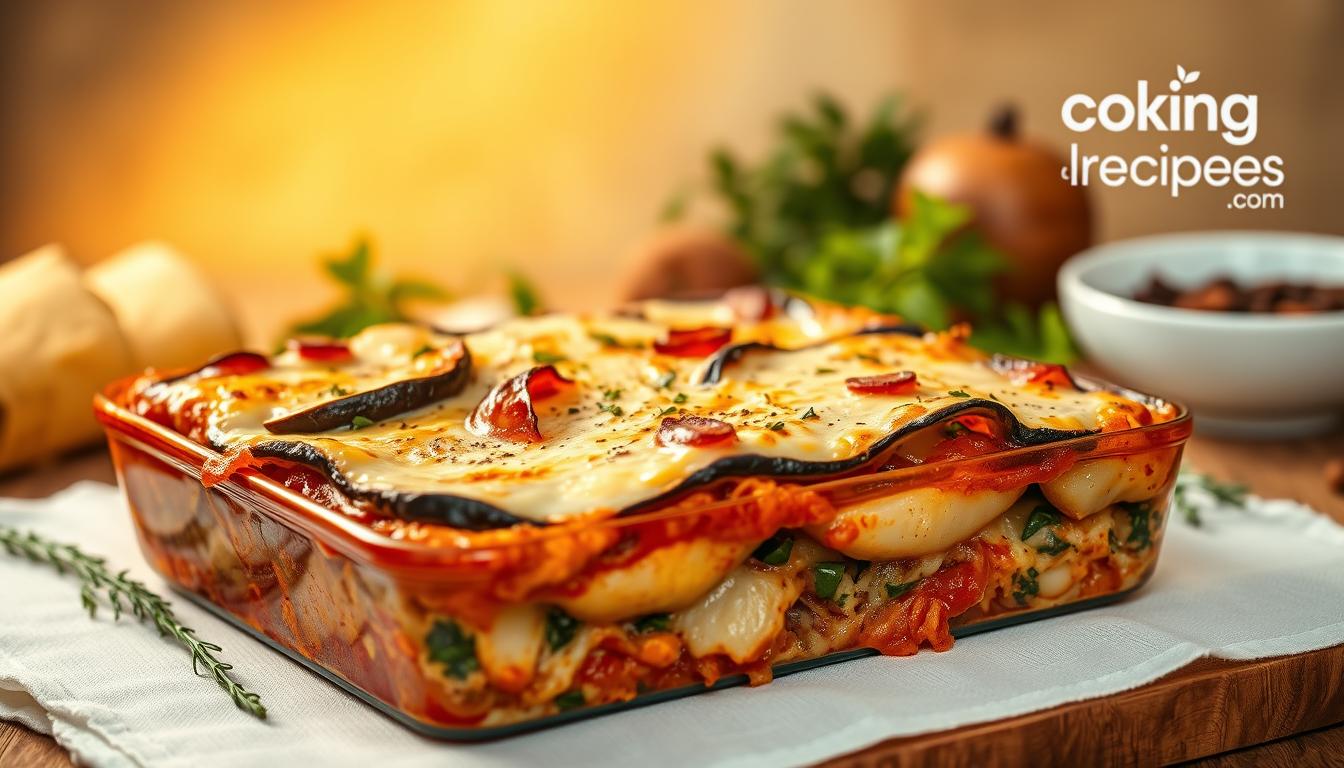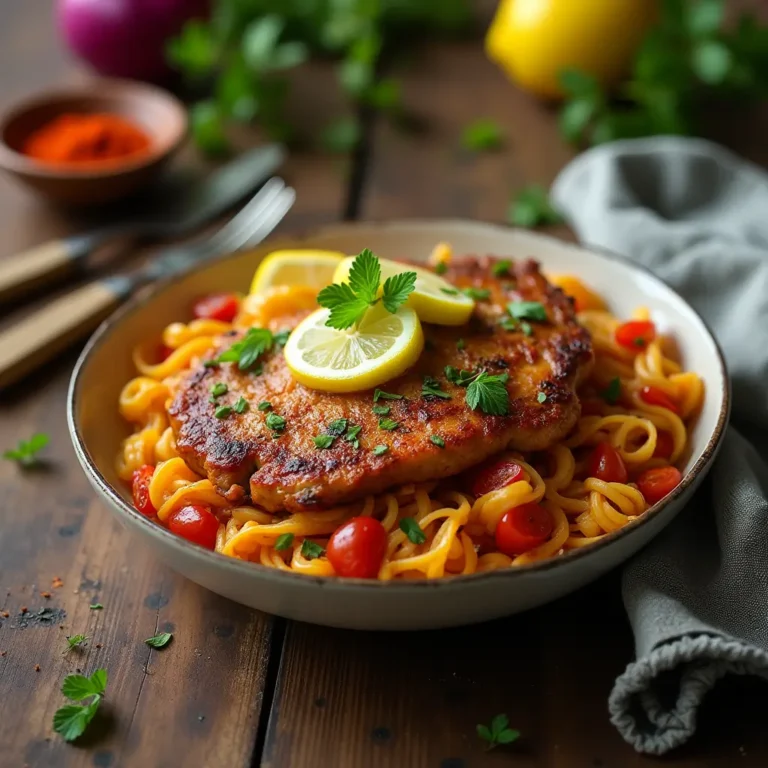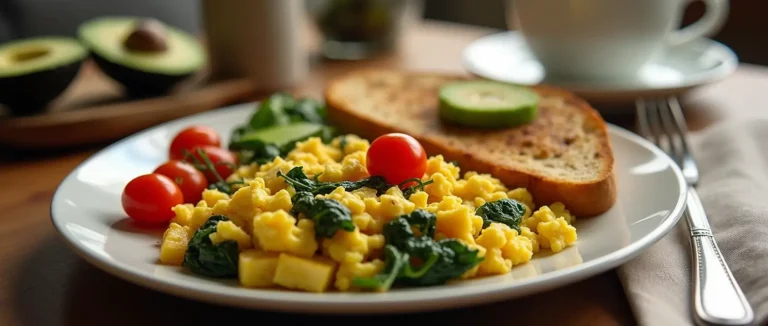Rich & Savory Vegetarian Moussaka: A Mediterranean Flavor Bomb

Table of Contents
Ever had a meal that feels like a warm hug from the Mediterranean? Picture golden layers of roasted eggplant, potatoes, and zucchini nestled between a smoky tomato-lentil sauce and velvety bechamel. This dish isn’t just food—it’s a celebration of sun-soaked flavors that’ll make your taste buds dance.
While rooted in traditional Greek cuisine, this version swaps meat for protein-packed lentils without losing an ounce of richness. Every bite balances earthy spices, sweet tomatoes, and the creaminess of that iconic topping. And yes, it’s worth every minute of prep time—because great meals aren’t rushed and crafted with care.
You don’t need fancy skills, just a love for bold flavors. We’ll walk through each layer, from choosing the perfect olive oil for roasting vegetables to mastering the silky bechamel. Whether hosting friends or treating yourself, this recipe turns dinner into an event.
Ready to bring the energy of a Greek taverna to your kitchen? Let’s dive into creating a dish that’s as nourishing as it is unforgettable. Trust us—your table (and your stomach) will thank you.
Discovering the Mediterranean Flavor of Vegetarian Moussaka
Imagine biting into layers of history seasoned with innovation. This layered dish began as a humble Middle Eastern creation, evolving through centuries before becoming Greece’s crown jewel of comfort food.
A Brief History of Moussaka
Rooted in 13th-century Arabic kitchens, early versions featured eggplant, onions, garlic, and spiced meat soaked in fat. The name itself comes from “musaqqâ”—Arabic for “moistened”—a nod to its saucy texture. By the 1920s, Greek chef Nikolaos Tselementes reimagined it with French flair, adding creamy béchamel and stacking veggies like potatoes into the iconic layers we love today.
The Vegetarian Twist to a Classic Dish
Modern recipes swap meat for earthy black lentils or mushrooms, cutting prep time by 15-20 minutes without sacrificing depth. The magic lies in how plant-based proteins absorb spices and olive oil, creating meaty richness. Even traditionalists agree—the vegetarian version’s crispy eggplant and velvety béchamel make it just as satisfying as its ancestor.
Whether you spend 90 minutes or two hours, both versions share one truth: every layer tells a story. And yours? It’s about to get delicious.
Essential Ingredients and Tools for Your Vegetarian Moussaka
Before you dive into layering flavors, let’s organize your kitchen battlefield. Success hinges on fresh ingredients and reliable tools—think of them as your culinary paintbrushes.
Building Blocks of Flavor
Start with firm, glossy eggplants—they’ll roast into silky perfection. Waxy potatoes hold their shape during baking, while ripe tomatoes add natural sweetness to the sauce. Don’t forget:
| Ingredient | Role | Pro Tip |
|---|---|---|
| Russet potatoes | Base layer structure | Slice ¼” thick |
| Fresh eggs | Bechamel binder | Room temperature |
| San Marzano tomatoes | Sauce depth | Hand-crush for texture |
Your Kitchen Allies
A heavy-bottomed pan distributes heat evenly when sautéing lentils. Use a deep bowl for mixing bechamel—its high sides prevent splatters. Essential gear includes:
| Tool | Purpose | Alternative |
|---|---|---|
| Mandoline slicer | Uniform veggie cuts | Sharp chef’s knife |
| 9×13 baking dish | Layering canvas | Cast iron skillet |
| Whisk | Smooth sauce | Wooden spoon |
Pre-slice vegetables and measure spices before cooking. This prep work cuts active time by 25%. With everything within reach, you’ll layer like a pro—no frantic searching for that missing cinnamon stick!
Prepping Vegetables and Oils
What’s the secret to transforming ordinary veggies into flavor-packed stars? It starts long before they hit the oven. Proper prep unlocks their full potential—think crispy edges, tender centers, and zero bitterness.
Salting eggplant slices isn’t optional—it’s your defense against spongy texture. Sprinkle kosher salt generously on both sides, then let them sweat for 30 minutes. You’ll watch droplets form as moisture escapes, taking harsh flavors with them. Rinse and pat dry for silky results.
Uniformity rules when slicing:
| Vegetable | Ideal Thickness | Tool |
|---|---|---|
| Eggplant | ½ inch | Mandoline |
| Potatoes | ¼ inch | Sharp knife |
| Zucchini | ⅓ inch | Adjustable slicer |
Season like a pro: toss slices with olive oil, then salt and pepper them individually. This creates flavor layers instead of bland patches. Work quickly—once cut, veggies start losing moisture, which can double your prep time if you dawdle.
Pro tip: Arrange slices in single layers on paper towels while prepping. Overlapping creates steam pockets that turn crisp edges soggy. Your future self will thank you when every bite delivers that satisfying crunch.
4 Affordable Kitchen Tools for Perfect Vegetarian Moussaka (All Under $50!)
| Essential Tool | Recommended Product | Why You Need It |
|---|---|---|
| 9-Speed Hand Mixer | Hamilton Beach (Under $30) | Perfect for smooth béchamel sauce without lumps |
| Basic Food Chopper | Black+Decker (Under $25) | Quickly chops eggplant and potatoes for layering |
| Digital Oven Thermometer | Taylor Precision (Under $15) | Ensures even baking of your moussaka layers |
| Compact Blender | Oster (Under $40) | Makes creamy lentil filling in seconds |
Crafting a Rich Tomato-Lentil Sauce
The soul of this dish lives in its simmering sauce—a hearty blend where earthy lentils soak up spices like thirsty sponges. Start by sautéing diced onions and garlic until golden, then stir in rinsed black lentils. Their firm texture holds up better than brown varieties during cooking, giving your sauce a satisfying bite.
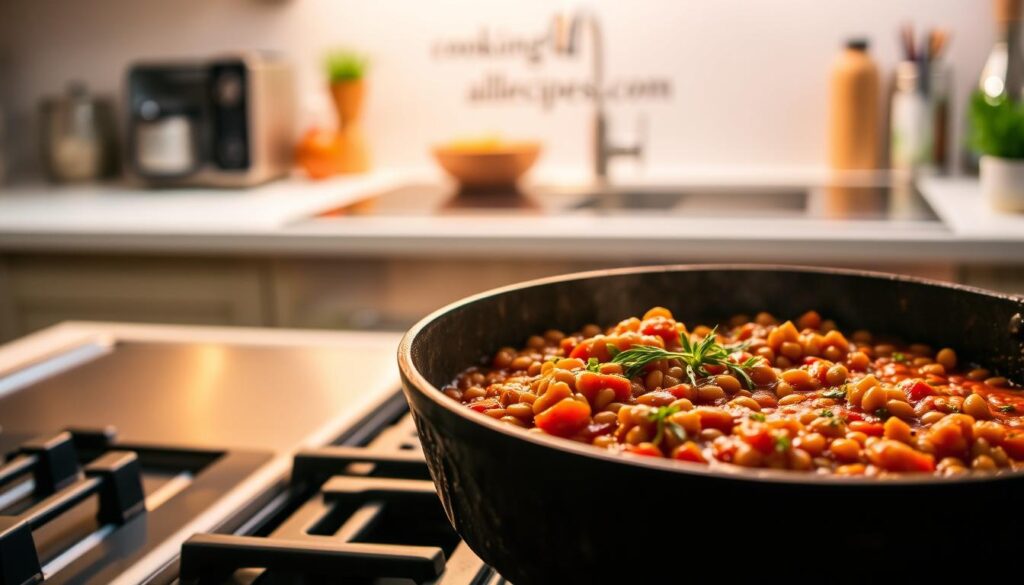
Add crushed tomatoes and a pinch of cinnamon—the spice that whispers “Mediterranean” without overpowering. Here’s where magic happens: pour in water gradually, letting the mixture bubble until it thickens into a chunky consistency. Too thin? Cook longer. Too thick? Splash in more liquid. You’re aiming for spoon-coating richness.
Balance flavors with this trio:
| Ingredient | Role | Tip |
|---|---|---|
| Tomato paste | Depth booster | Cook 2 minutes first |
| Oregano | Herbal brightness | Add last 5 minutes |
| Red wine vinegar | Tangy finish | 1 tsp post-simmer |
Simmering isn’t just cooking—it’s flavor alchemy. Low heat coaxes out the lentils’ nuttiness while mellowing the tomatoes’ acidity. Taste as you go, adjusting spices until every spoonful makes you pause and smile. That’s when you know it’s ready to layer.
Making Creamy Bechamel Sauce
What transforms good layers into greatness? A velvety bechamel that blankets your dish like liquid silk. Start by melting 4 tbsp butter over medium heat—too hot, and it’ll brown. Whisk in ¼ cup flour until golden, creating a roux that thickens your sauce without lumps.
Pour milk slowly—½ cup at a time—while whisking nonstop. Cold milk causes clumps, so warm it first. The mixture will thicken gradually, turning glossy after 5-7 minutes. Too thin? Cook longer. Too thick? Add more milk.
| Step | Key Action | Pro Tip |
|---|---|---|
| Roux Base | Cook flour-butter 2 mins | Use flat whisk for corners |
| Milk Addition | Add warm liquid slowly | 40-second pours |
| Cheese Blend | Stir off heat | Grate finely |
Remove from heat before stirring in 1 cup grated cheese. Parmesan adds sharpness, while kefalotyri offers authenticity. Finish with ¼ tsp nutmeg—its warm aroma ties everything together.
Spotting perfect texture? The sauce should coat your spoon thickly but drip slowly. Let it cool slightly before spreading—it’ll set beautifully in the oven. Master this, and you’ve cracked the code to luxurious layers that’ll have everyone asking for seconds.
Vegetarian Moussaka: Assembly and Baking Techniques
Ever wonder how those restaurant-perfect layers stay intact? It’s all about smart stacking and heat control. Start with a 9×13 baking dish lightly greased with olive oil—this prevents sticking and adds subtle richness to the base.
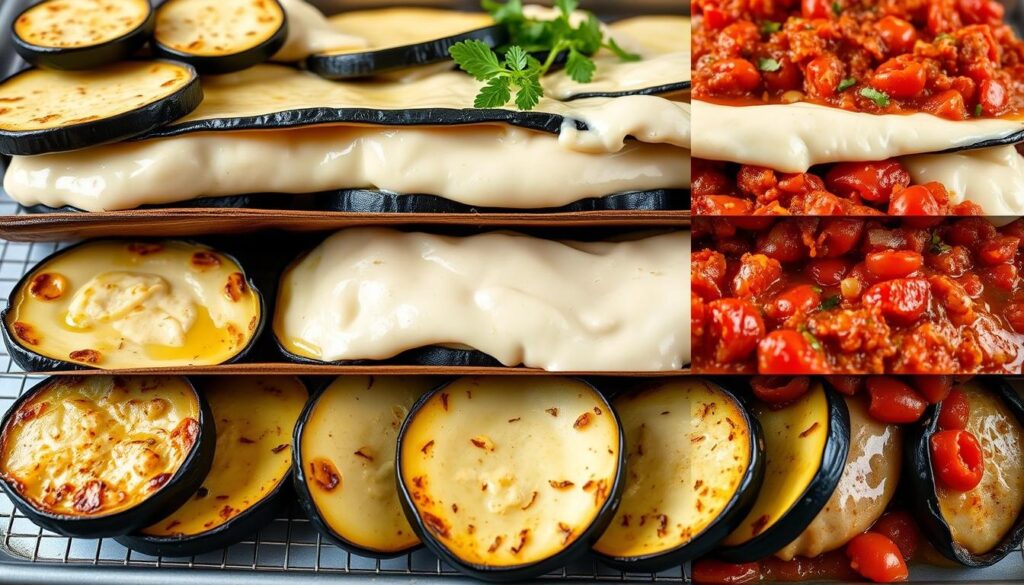
| Layer Order | Component | Pro Tip |
|---|---|---|
| 1st | Potatoes | Overlap slices slightly |
| 2nd | Eggplant & Zucchini | Press down gently |
| 3rd | Tomato-Lentil Sauce | Spread edge-to-edge |
| 4th | Bechamel | Use offset spatula |
Preheat your oven to 375°F before assembling—this ensures even baking from the first minute. Pour the final bechamel layer like thick cream, making sure it reaches all corners. A quick jiggle of the dish helps eliminate air pockets.
Watch for three visual cues: bubbling edges, golden-brown top, and slight pulling from the sides. This usually takes 35-40 minutes. If the crust colors too fast, tent loosely with foil. Let rest 15 minutes before slicing—this cooling period lets layers set for cleaner cuts.
Make-Ahead Tips and Storage for Your Moussaka
Want to enjoy this hearty dish without last-minute stress? Prep components up to 3 days ahead. Roast vegetables and store them in airtight fridge containers—they’ll stay fresh while absorbing olive oil’s richness. Lentil sauce tastes even better after chilling overnight, as spices meld together.
Assemble fully but wait to bake. Cover your dish tightly and refrigerate for 48 hours. Let it sit at room temperature 1 hour before baking—this prevents cracking and helps layers heat evenly.
Reheating leftovers? Use medium heat (325°F) and cover with foil to retain moisture. Sprinkle water on top if the bechamel looks dry. For single servings, microwave at 50% power with a damp paper towel over the plate.
Pair slices with a crisp salad dressed in lemon vinaigrette. The acidity cuts through richness while fresh herbs echo the sauce’s seasonings. Try arugula with cherry tomatoes and shaved fennel for crunch.
Pro tip: Label containers with dates and layer order. Your future self will praise your organized fridge—and those ready-to-bake flavors that taste like you just cooked them fresh.
Conclusion
You’ve just unlocked a masterpiece where tradition meets creativity. From thinly sliced onions sizzling in golden olive oil to the earthy aroma of simmering garlic and cloves, every step builds toward a symphony of Mediterranean flavors. The secret? Letting quality ingredients shine—sun-ripened tomato sauce, fragrant oregano, and protein-packed lentils that keep each bite hearty.




Remember: patience pays off. Whether you’re layering roasted veggies or perfecting that creamy topping, each stage matters. Don’t rush the process—those 15 minutes of resting time ensure your creation slices cleanly, revealing those Instagram-worthy layers.
Now’s your chance to put a personal spin on this classic. Swap herbs, adjust spice levels, or try a drizzle of chili-infused olive oil for heat. Trust your instincts—great cooking thrives on experimentation. Share it with friends, savor it solo, or stash leftovers for tomorrow’s lunch. Either way, you’ve earned every delicious bite.
FAQ
Can I substitute lentils with another protein source?
How do I prevent the eggplant from becoming soggy?
Is there a gluten-free alternative for the béchamel?
Can I freeze leftovers?
What’s the ideal potato thickness for layering?
How long does assembled moussaka last in the fridge?
Can I use fresh tomatoes instead of canned?
Why did my béchamel sauce curdle?
How did you find this recipe?
There are no reviews yet. Be the first one to write one.

